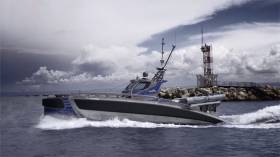Displaying items by tag: Defence
#Navy - The future of maritime defence is here – in the form of a torpedo-wielding drone boat called Seagull.
The video below from Vocativ shows a prototype of the 40ft vessel in action, displaying its stealthy manoeuvrability on the water.
Watch video!Developed by an Israeli company, the Seagull is intended for the most dangerous tasks at sea such as minesweeping or anti-submarine missions.
Effectively, just a handful of such boats could replace the work currently done by teams of US Navy destroyers and long-range aircraft.
Popular Mechanics has more on the story HERE.
Budget 2011: Fisheries Spending Maintained, Cuts to Irish Sports Council
Expenditure on fisheries will be maintained at 2010 levels under the Budget for 2011 announced today.
Minister for Agriculture, Fisheries and Food, Brendan Smith TD, welcomed the protection of expenditure in forestry/bioenergy and fisheries, saying it “reflects the important economic and social contributions that both sectors make to rural and coastal communities throughout the country and the potential that they have to play in the wider economy.”
Elsewhere in the Budget, the rise in the cost of fuel - which will hurt motorists and many boat-owners alike - is accompanied by cuts across Government departments which could affect maritime activities from sport to coastal policing.
Cuts to the Tourism, Culture & Sport will mean reduced finding for the already cash-strapped Irish Sports Council and other sporting bodies, hitting hard on Ireland’s developing sporting talent - particularly in niche maritime and water sports.
No specific cuts to naval spending were outlined, but the Defence budget will be reduced by €28 million in the coming year, which will also see a halt on the acquisition of replacement equipment and maintenance projects.
However this does not apply to the producement of two new naval vessels which “will continue within the reduced allocation for Defence spending”, according to Minister for Defence Tony Killeen TD.
No details were given for any proposed cuts to the Irish Coast Guard and Maritime Safety Directorate, although the Department of Transport which overseas both arms of the Maritime Safety Services will face cuts of €32 million in 2011.
























































